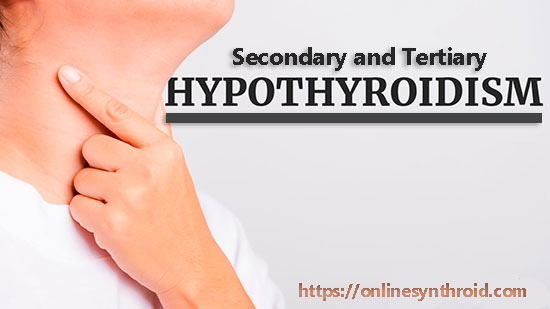We offer you a short article with the most important information on the treatment of secondary and tertiary hypothyroidism. These diseases differ from “normal” hypothyroidism, in which most patients have to take Synthroid all the time. However, even with these diagnoses, the doctor will prescribe you the same medicine. Unfortunately, scientists have not yet come up with other effective methods for such conditions.
Brief description of secondary and tertiary hypothyroidism
In short, the diagnosis of hypothyroidism means a deficiency of thyroxine (T4), which leads to a total slowdown of metabolic processes and disruption in the functioning of many body systems.
The main types of hypothyroidism include:
- primary hypothyroidism, resulting from damage to the thyroid gland for a variety of reasons
- secondary hypothyroidism, which occurs due to a deficiency or absence of secretion of the thyroid-stimulating hormone TSH and a decrease in the function of the pituitary gland (neoplasms, inflammation and infection, trauma, radiation, surgery, vascular damage)
- tertiary hypothyroidism, resulting from the absence or deficiency of thyroliberin TRH due to damage to the hypothalamus or violation of the integrity of the pituitary stalk.
With secondary and tertiary hypothyroidism, clinical symptoms are usually less pronounced than with primary hypothyroidism. On the other hand, such patients often show signs of insufficiency of other endocrine glands (in particular, the adrenal cortex), or symptoms of diabetes insipidus.

Treatment of secondary / tertiary hypothyroidism
First of all, just as in the case of the “usual” diagnosis, patients should take synthetic hormones. In other words, they need levo-thyroxine sodium (T4), or simply Synthroid pills. An artificial hormone not produced by the body allows patients feel better and live longer. As you know, the disease can even lead to coma and premature death. Fortunately, standard lifelong secondary and tertiary hypothyroidism therapy enables everyone to maintain a decent quality of life.
Unlike primary hypothyroidism, secondary and tertiary ones are equally common in both men and women.
In therapy for these diagnoses, doctors prescribe lower dosages of the drug. For example, elderly people and patients with serious concomitant diseases should pay special attention to the dose and the body response when taking the pills. Anyway, do not give up hormone therapy if the body has stopped producing thyroid hormone on its own.
In more than 50% of cases, acquired secondary hypothyroidism appears due to hormonally active and hormonally inactive macroadenomas of the pituitary gland.
As a rule, experts calculate the dosage in the range of 1.1 mcg to 1.3 mcg (rarely up to 1.6 mcg) per KG of body weight per day. The exact dose in the treatment of secondary and tertiary hypothyroidism depends on many factors. In particular, they include age of the patient and the “age” of diagnosis, the presence of comorbidities, clinical test scores, and so on. Therefore, with such a diagnosis, better not self-medicate, but see a doctor.
Elderly people, patients with cardiovascular diseases or with severe long-term hypothyroidism should start their therapy with the lowest doses of Synthroid.




